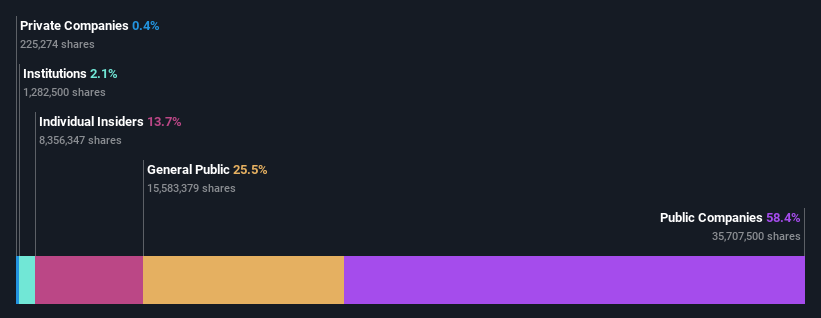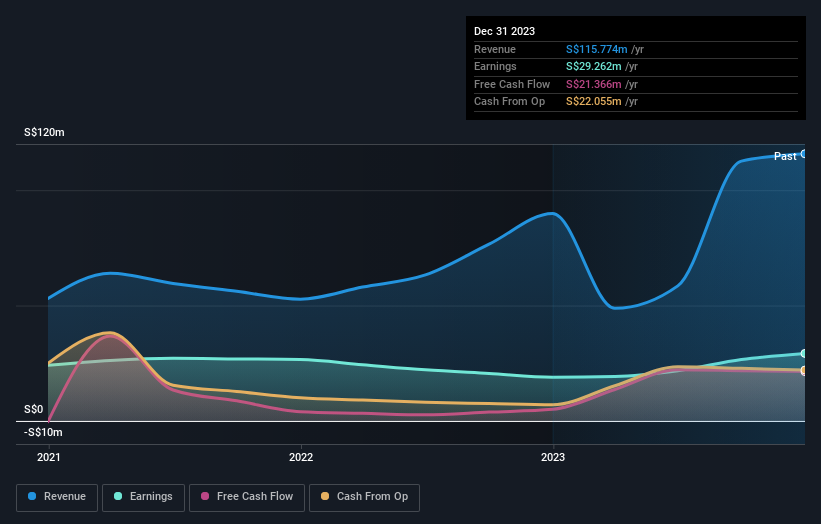Individual investors own 25% of United Overseas Insurance Limited (SGX:U13) shares but public companies control 58% of the company
Key Insights
Significant control over United Overseas Insurance by public companies implies that the general public has more power to influence management and governance-related decisions
United Overseas Bank Limited owns 58% of the company
If you want to know who really controls United Overseas Insurance Limited (SGX:U13), then you'll have to look at the makeup of its share registry. The group holding the most number of shares in the company, around 58% to be precise, is public companies. Put another way, the group faces the maximum upside potential (or downside risk).
Meanwhile, individual investors make up 25% of the company’s shareholders.
Let's take a closer look to see what the different types of shareholders can tell us about United Overseas Insurance.
See our latest analysis for United Overseas Insurance
What Does The Institutional Ownership Tell Us About United Overseas Insurance?
Institutional investors commonly compare their own returns to the returns of a commonly followed index. So they generally do consider buying larger companies that are included in the relevant benchmark index.
Since institutions own only a small portion of United Overseas Insurance, many may not have spent much time considering the stock. But it's clear that some have; and they liked it enough to buy in. So if the company itself can improve over time, we may well see more institutional buyers in the future. When multiple institutional investors want to buy shares, we often see a rising share price. The past revenue trajectory (shown below) can be an indication of future growth, but there are no guarantees.
We note that hedge funds don't have a meaningful investment in United Overseas Insurance. The company's largest shareholder is United Overseas Bank Limited, with ownership of 58%. This essentially means that they have extensive influence, if not outright control, over the future of the corporation. In comparison, the second and third largest shareholders hold about 3.5% and 2.0% of the stock.
While studying institutional ownership for a company can add value to your research, it is also a good practice to research analyst recommendations to get a deeper understand of a stock's expected performance. We're not picking up on any analyst coverage of the stock at the moment, so the company is unlikely to be widely held.
Insider Ownership Of United Overseas Insurance
The definition of an insider can differ slightly between different countries, but members of the board of directors always count. Management ultimately answers to the board. However, it is not uncommon for managers to be executive board members, especially if they are a founder or the CEO.
I generally consider insider ownership to be a good thing. However, on some occasions it makes it more difficult for other shareholders to hold the board accountable for decisions.
It seems insiders own a significant proportion of United Overseas Insurance Limited. Insiders own S$57m worth of shares in the S$415m company. It is great to see insiders so invested in the business. It might be worth checking if those insiders have been buying recently.
General Public Ownership
With a 25% ownership, the general public, mostly comprising of individual investors, have some degree of sway over United Overseas Insurance. While this size of ownership may not be enough to sway a policy decision in their favour, they can still make a collective impact on company policies.
Public Company Ownership
We can see that public companies hold 58% of the United Overseas Insurance shares on issue. This may be a strategic interest and the two companies may have related business interests. It could be that they have de-merged. This holding is probably worth investigating further.
Next Steps:
While it is well worth considering the different groups that own a company, there are other factors that are even more important. Consider for instance, the ever-present spectre of investment risk. We've identified 2 warning signs with United Overseas Insurance (at least 1 which makes us a bit uncomfortable) , and understanding them should be part of your investment process.
Of course, you might find a fantastic investment by looking elsewhere. So take a peek at this free list of interesting companies.
NB: Figures in this article are calculated using data from the last twelve months, which refer to the 12-month period ending on the last date of the month the financial statement is dated. This may not be consistent with full year annual report figures.
Have feedback on this article? Concerned about the content? Get in touch with us directly. Alternatively, email editorial-team (at) simplywallst.com.
This article by Simply Wall St is general in nature. We provide commentary based on historical data and analyst forecasts only using an unbiased methodology and our articles are not intended to be financial advice. It does not constitute a recommendation to buy or sell any stock, and does not take account of your objectives, or your financial situation. We aim to bring you long-term focused analysis driven by fundamental data. Note that our analysis may not factor in the latest price-sensitive company announcements or qualitative material. Simply Wall St has no position in any stocks mentioned.
Have feedback on this article? Concerned about the content? Get in touch with us directly. Alternatively, email editorial-team@simplywallst.com

 Yahoo Finance
Yahoo Finance 

